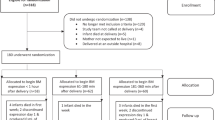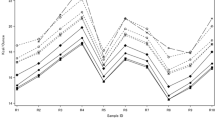Abstract
THE belief that the rate of milk secretion declines with time during the interval between successive milkings is based on an observed increase from thrice daily and a decrease from once daily milking over normal twice daily milkings, and on Edwards's1 calculations of secretion-rates in milking intervals of different length. Turner2 recently questioned Edwards's conclusions on the grounds of the regression of residual on total milk yield and suggested that the secretion-rate does not decrease until after twenty hours. On the other hand, Bailey, Clough and Dodd3 claim to have re-established that milk secretion rate does decrease with time.
This is a preview of subscription content, access via your institution
Access options
Subscribe to this journal
Receive 51 print issues and online access
$199.00 per year
only $3.90 per issue
Buy this article
- Purchase on Springer Link
- Instant access to full article PDF
Prices may be subject to local taxes which are calculated during checkout
Similar content being viewed by others
References
Edwards, J., J. Agric. Sci., 40 (1950).
Turner, H. G., Aust. J. Agric. Res., 4, 118 (1953).
Bailey, G. L., Clough, P. A., and Dodd, F. H., Nature, 173, 404 (1953).
Author information
Authors and Affiliations
Rights and permissions
About this article
Cite this article
ELLIOTT, G., BRUMBY, P. Rate of Milk Secretion with Increasing Interval between Milking. Nature 176, 350–351 (1955). https://doi.org/10.1038/176350a0
Issue Date:
DOI: https://doi.org/10.1038/176350a0
This article is cited by
-
Milk Production and Interval between Milking
Nature (1956)
Comments
By submitting a comment you agree to abide by our Terms and Community Guidelines. If you find something abusive or that does not comply with our terms or guidelines please flag it as inappropriate.



